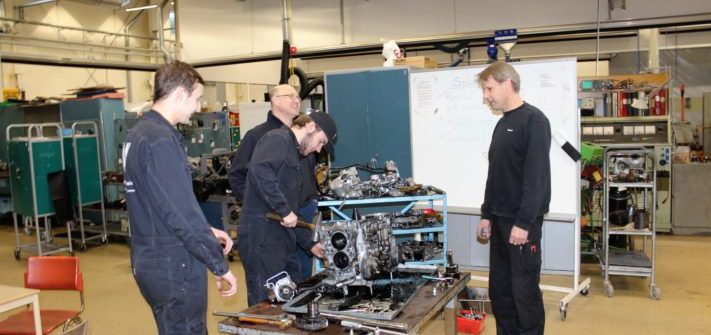Erasmus + has granted support for a new project that aims to develop transnational practices and tools for Intercultural competence in VET for wood, metal and vehicle industry. More people than ever before are seeking asylum in EU. Government Offices and other agencies are working intensively to increase the capacity of the reception and the establishment of new arrivals and solve the great challenges that exist. But no country can handle this challenge alone. It is a need of shared responsibility between the countries of the EU. This project will develop tools for intercultural competence for VET staff and work based mentors to facilitate the transition for refugees to employment as e.g. woodworkers, vehicle mechanics and metal industrial workers in industries that demand labour. Recently Mrs Marlis Tepe, president of GEW (Gewerkschaft Erziehung und Wissenschaft) the largest teacher union in Germany pointed out the need of intercultural competence. It is likely to believe that VET staff and work-based mentors has a need of intercultural competence to support and motive learners and apprentices and to more effectively achieve the learning outcomes of VET-learners with multiple cultural background as well. It is a win-win situation if bottle necks can be reduced for the large number of new arrivals to get jobs in the industry that has a great need for workers. Industries in wood, metal and vehicle is screaming for employees’. Only in Sweden the industry need to enlist thousands employees during the three-year period. Almost half, 47 percent, of companies in industry have difficulty finding new staff with the right skills, particularly in terms of technicians and mechanics, according to a new national report from the Motor Industry professional committees (MYN), source Bilproffs.se. At the same time new arrivals need to establish at the labour market. VET is on important puzzle piece for integration and will face new challenges for many years to come.
The application is developed by Amledo & Co. in collaboration with HWK Gera, Germany, Aventus College, The Netherlands and bit Schulungscenter GmbH, Austria. The project runs from 2016 to 2019. Intercultural competence in VET for wood, metal and vehicle industry: 2016-1-SE01-KA202-022082.


Intercultural competence in VET for wood, metal and vehicle industry
Erasmus + has granted support for a new project that aims to develop transnational practices and tools for Intercultural competence in VET for wood, metal and vehicle industry. More people than ever before are seeking asylum in EU. Government Offices and other agencies are working intensively to increase the capacity of the reception and the establishment of new arrivals and solve the great challenges that exist. But no country can handle this challenge alone. It is a need of shared responsibility between the countries of the EU. This project will develop tools for intercultural competence for VET staff and work based mentors to facilitate the transition for refugees to employment as e.g. woodworkers, vehicle mechanics and metal industrial workers in industries that demand labour. Recently Mrs Marlis Tepe, president of GEW (Gewerkschaft Erziehung und Wissenschaft) the largest teacher union in Germany pointed out the need of intercultural competence. It is likely to believe that VET staff and work-based mentors has a need of intercultural competence to support and motive learners and apprentices and to more effectively achieve the learning outcomes of VET-learners with multiple cultural background as well. It is a win-win situation if bottle necks can be reduced for the large number of new arrivals to get jobs in the industry that has a great need for workers. Industries in wood, metal and vehicle is screaming for employees’. Only in Sweden the industry need to enlist thousands employees during the three-year period. Almost half, 47 percent, of companies in industry have difficulty finding new staff with the right skills, particularly in terms of technicians and mechanics, according to a new national report from the Motor Industry professional committees (MYN), source Bilproffs.se. At the same time new arrivals need to establish at the labour market. VET is on important puzzle piece for integration and will face new challenges for many years to come.
The application is developed by Amledo & Co. in collaboration with HWK Gera, Germany, Aventus College, The Netherlands and bit Schulungscenter GmbH, Austria. The project runs from 2016 to 2019. Intercultural competence in VET for wood, metal and vehicle industry: 2016-1-SE01-KA202-022082.